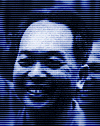Gen. Vo Nguyen Giap
 Born 1911 - Died Oct 4 2013
Born 1911 - Died Oct 4 2013General and Commander PAVN Politburo Communist Party 1951-1976 Minister of Defence 1946-1980 General Giap was considered to be one of the most interesting characters of the Vietnam War. He had received no formal instruction in military science, but was by no means ignorant of the art of war. He admired Napoleon and T.E. Lawrence and described himself as a self-taught general. Born in the region close to the DMZ (An Xa) and attending Quoc Hoc Academy in Hué, he was expelled following a student strike and later earned a degree in law at the University of Hanoi, which was a French institution. Giap's first command was a group of 34 guerillas, which he led to some small victories; at the end of his career he commanded the world's third largest army and was hailed as the architect of Vietnam's victory. After the French banned the Communist Party, Giap fled to China where he became a key deputy of Ho Chi Minh and was given command over the Viet Minh guerrilla forces fighting the Japanese from 1940 to 1945. The Communists seized control in 1945 and Giap became one of the top figures in the newly formed government. During the war against the French, Giap shaped the People's Army of Vietnam (PAVN) into a potent fighting force. His historical reputation results from his victory at Dien Bien Phu in May 1954. Using siege tactics, Giap defeated the French with an extraordinary logistical buildup and effective use of a well-protected artillery. He achieved French surrender just days before the Geneva Conference, which would negotiate the French withdrawal from Vietnam, but would leave the country divided. In the late 1950's through to the late 1960's, Giap remained a key military figure but became embroiled in a fierce debate over the strategy for reunification. Eventually this power struggle would lead to the Communist Party demoting and ridiculing him. In 1967, Giap was the designer of the Tet offensive; this proved to be his last great military involvement, retiring in 1973 after the failed Ester Offensive. Reportedly suffering from illness, Giap resigned his position as minister of defense in 1980 and lost his seat in the politburo in 1982, after which he became chief of the Science and Technology Commission. In July 1992, he was awarded the Gold Star Order, Vietnam's highest decorative honor. |